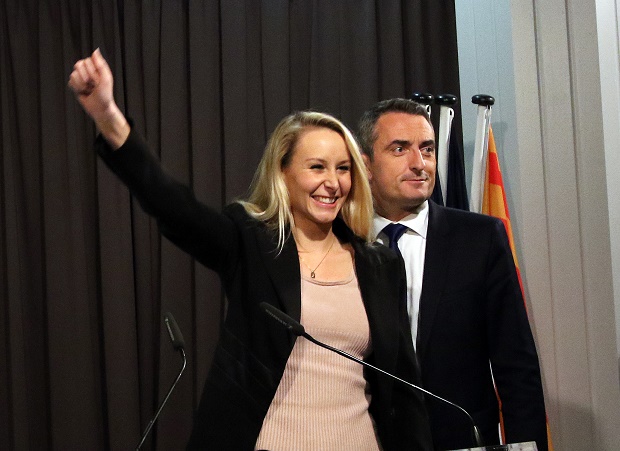
Far right National Front party regional leader for southeastern France Marion Marechal-Le Pen rises her arm after the second round of the regional elections in Marseille, southern France, Sunday, Dec.13, 2015. Marine Le Pen’s far-right National Front collapsed in French regional elections Sunday after dominating the first round of voting, according to pollsters’ projections. Far right National Front Senator Stephane Ravier is behind. AP Photo
PARIS, France—France’s far-right National Front (FN) failed to win a single region in elections Sunday despite record results in the first round, as voters flocked to traditional parties to keep them out of power.
With presidential elections due in 2017, the anti-immigration FN had hoped the regional polls would act as a springboard for leader Marine Le Pen.
READ: Anti-Muslim migration party soars in French elections
But she was trounced by the right-wing opposition in the northern Nord-Pas-de-Calais-Picardie region after the ruling Socialists pulled out of the race before the second round.
Her 26-year-old niece Marion Marechal-Le Pen was also clearly defeated by the right-wing grouping in the southern region that includes the glitzy resorts of the Cote d’Azur, despite dominating the first round last week.
The FN had topped the vote in six of 13 regions on December 6, propelled by anger over the struggling economy and fears created by last month’s jihadist attacks in Paris that left 130 dead.
READ: More than 120 people killed in Paris ‘terror’ attacks
But exactly a month on from those attacks, voters turned out in force—some 58 percent took part—and once again trounced the FN when it came down to the wire.
The ruling Socialists of President Francois Hollande looked to have won at least five regions, while the centre-right alliance of his predecessor Nicolas Sarkozy was leading in seven. Nationalists won in Corsica.
Socialist Prime Minister Manuel Valls warned that despite the result “the danger of the far-right has not been removed, far from it.”
Sarkozy, leader of the Republicans party, praised the voters who turned out on Sunday but said “the warnings” of the first round must not be forgotten.
‘Nothing can stop us’
Early estimates showed Le Pen scored around 42 percent to nearly 58 percent for her right-wing rival Xavier Bertrand in the economically depressed north.
Her niece took around 45 percent of the vote to nearly 55 percent for her right-wing rival in the FN’s traditional stronghold in Provence-Alpes-Cote-d’Azur.
Both women had easily won the first round.
In a combative speech to supporters after polls closed, Le Pen said “nothing can stop us now.”
“In its northern and southern bastions we’ve eradicated the evil-doing Socialist Party,” she said.
“By tripling our number of councillors, we will be the main opposition force in most of the regions of France,” she added.
Equally defiant, her niece urged supporters not to be disappointed. “We will redouble our efforts,” she said. “There are some victories that shame the winners.”
The FN has topped European and local polls over the past two years, bolstering Le Pen’s claim that it is now “the first party of France.”
But Sunday’s results showed once again that the party struggles in the deciding round as mainstream voters gang up to keep it from power as they did in 2002 when voters switched to Jacques Chirac in a presidential run-off against Marine’s father, Jean-Marie Le Pen.
One of the biggest victories on Sunday went to Socialist Defence Minister Jean-Yves Le Drian, who will head the Brittany region where he won over half the vote, while also remaining in his government post.
One of the biggest upsets came in the Paris region, which shifted from left to right for the first time in 17 years.
‘De-demonized’ party
The FN argues that the political manoeuvring by the main two political parties shows they are two sides of the same coin and the far-right offers the only real political alternative.
“Frankly, I’m voting against the FN in the interests of my family,” said Issa Kouyate, a 59-year-old voter of Senegalese origin, as he cast his ballot in the southern city of Marseille, where a high proportion of citizens are of immigrant background.
“There’s danger,” said Kouyate, describing the FN’s 40-percent score in the region’s first round as “a time bomb.”
The FN had taken 28 percent of the vote nationally in the first round, ahead of 27 percent for the Republicans and their allies.
Le Pen has reaped the rewards of her efforts to “de-demonize” the party bequeathed by her father, but it retains a stridently anti-immigrant edge. Critics accuse it of fomenting Islamophobia.
Her campaign also exploited anger over the situation in the northern port of Calais, where thousands of migrants are camping in squalid conditions.
France’s regions have recently been enlarged and they have powers over areas such as transport, schooling and local business support.

